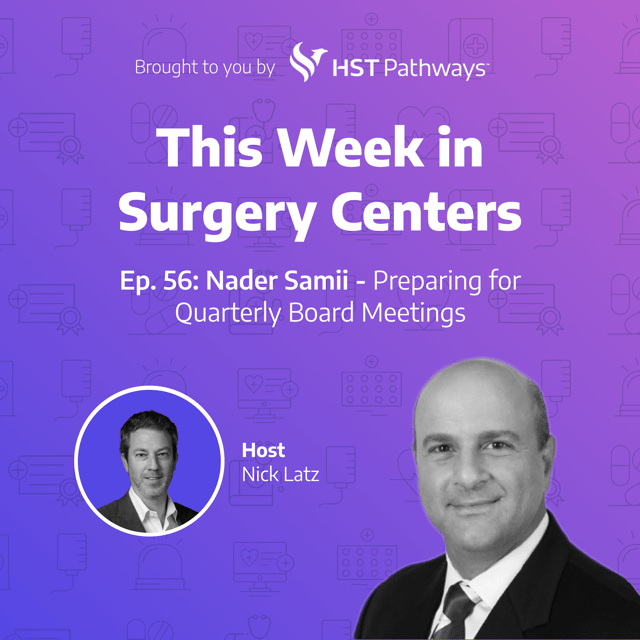

Every ASC is required to hold a quarterly board meeting in order to stay in compliance and remain accredited. Nader Samii, CEO of nimble, is on today to talk through how you can make those meetings as impactful, productive, and engaging as possible. He walks through how to properly prepare, the essential financial metrics you should always include, how to get ahead of potential surprises, and a bunch of other topics so you can look forward to these meetings instead of just going through the motions.
In our news recap, we’ll cover strategies to make your operating room more sustainable, what’s going on with the Lower Costs, More Transparency Act, the latest on EHR adoption, and, of course, end the news segment with a positive story about an emergency nurse in Arizona who went above and beyond the call of duty to save a man’s life.
Lastly, this will be our last episode in 2023! Our next episode will be published on January 9th. 2024 and will be a highlight reel of 12 of our most recent guests answering the question, “What is one thing our listeners can do this week to improve their surgery centers?”
Here is some content to hold you over through the two-week break:
- Six quick videos highlighting benchmarking data
- State of the Industry Report
- Watch one of our most popular episodes of the year
Articles Mentioned:
- Operation Room Strategies for Sustainability
- House Passes Healthcare Transparency Bill
- Trend to Watch: Is EHR Adoption Critical for ASCs?
- An ED Nurse Crosses Busy Freeway to Save a Life
Thank you so much for all your support this year, and I hope you all have a wonderful holiday and New Year’s celebration. We will see you again in 2024.
Brought to you by HST Pathways.

Every ASC is required to hold a quarterly board meeting in order to stay in compliance and remain accredited. Nader Samii, CEO of nimble, is on today to talk through how you can make those meetings as impactful, productive, and engaging as possible. He walks through how to properly prepare, the essential financial metrics you should always include, how to get ahead of potential surprises, and a bunch of other topics so you can look forward to these meetings instead of just going through the motions.
In our news recap, we’ll cover strategies to make your operating room more sustainable, what’s going on with the Lower Costs, More Transparency Act, the latest on EHR adoption, and, of course, end the news segment with a positive story about an emergency nurse in Arizona who went above and beyond the call of duty to save a man’s life.
Lastly, this will be our last episode in 2023! Our next episode will be published on January 9th. 2024 and will be a highlight reel of 12 of our most recent guests answering the question, “What is one thing our listeners can do this week to improve their surgery centers?”
Here is some content to hold you over through the two-week break:
- Six quick videos highlighting benchmarking data
- State of the Industry Report
- Watch one of our most popular episodes of the year
Articles Mentioned:
- Operation Room Strategies for Sustainability
- House Passes Healthcare Transparency Bill
- Trend to Watch: Is EHR Adoption Critical for ASCs?
- An ED Nurse Crosses Busy Freeway to Save a Life
Thank you so much for all your support this year, and I hope you all have a wonderful holiday and New Year’s celebration. We will see you again in 2024.
Brought to you by HST Pathways.




















